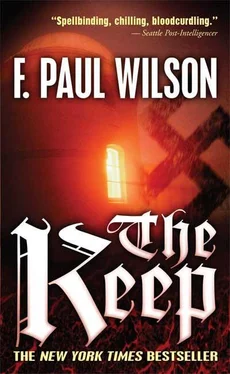F. Paul Wilson - The Keep
Здесь есть возможность читать онлайн «F. Paul Wilson - The Keep» весь текст электронной книги совершенно бесплатно (целиком полную версию без сокращений). В некоторых случаях можно слушать аудио, скачать через торрент в формате fb2 и присутствует краткое содержание. Жанр: Ужасы и Мистика, на английском языке. Описание произведения, (предисловие) а так же отзывы посетителей доступны на портале библиотеки ЛибКат.
- Название:The Keep
- Автор:
- Жанр:
- Год:неизвестен
- ISBN:нет данных
- Рейтинг книги:3 / 5. Голосов: 1
-
Избранное:Добавить в избранное
- Отзывы:
-
Ваша оценка:
- 60
- 1
- 2
- 3
- 4
- 5
The Keep: краткое содержание, описание и аннотация
Предлагаем к чтению аннотацию, описание, краткое содержание или предисловие (зависит от того, что написал сам автор книги «The Keep»). Если вы не нашли необходимую информацию о книге — напишите в комментариях, мы постараемся отыскать её.
The Keep — читать онлайн бесплатно полную книгу (весь текст) целиком
Ниже представлен текст книги, разбитый по страницам. Система сохранения места последней прочитанной страницы, позволяет с удобством читать онлайн бесплатно книгу «The Keep», без необходимости каждый раз заново искать на чём Вы остановились. Поставьте закладку, и сможете в любой момент перейти на страницу, на которой закончили чтение.
Интервал:
Закладка:
He had been helpless then, and he was helpless now. Helpless to make this war into one of soldier against soldier, helpless to stop the thing that was killing his men, helpless to stop Kaempffer from slaughtering those Romanian villagers.
He slumped into the chair. What was the use? Why even try anymore? Everything was changing for the worse. He had been born with the century, a century of hope and promise. Yet he was fighting in his second war, a war he could not understand.
And yet he had wanted this war. He had yearned for a chance to strike back at the vultures who had settled upon the Fatherland after the last war, saddling it with impossible reparations, grinding its face into the dirt year after year after year. His chance had come, and he had participated in some of the great German victories. The Wehrmacht was unstoppable.
Why, then, did he feel such malaise? It seemed wrong for him to want to be out of it all and back in Rathenow with Helga. It seemed wrong to be glad that his father, also a career officer, had died in the Great War and could not see what atrocities were being done today in the name of the Fatherland.
And still, with everything so wrong, he held on to his commission. Why? The answer to that one, he told himself for the hundredth—possibly the thousandth—time, was that in his heart he believed the German Army would outlast the Nazis. Politicians came and went, but the army would always be the army. If he could just hold on, the German Army would be victorious, and Hitler and his gangsters would fade from power. He believed that. He had to.
Against all reason, he prayed that Kaempffer's threat against the villagers would have the desired effect—that there would be no more deaths. But if it didn't work ... if another German was to die tonight, Woermann knew whom he wanted it to be.
TEN
The Keep
Tuesday, 29 April
0118 hours
Major Kaempffer lay awake in his bedroll, still rankling at Woermann's contemptuous insubordination. Sergeant Oster, at least, had been helpful. Like most regular army men, he responded with fearful obedience to the black uniform and the Death's Head insignia—something to which Oster's commanding officer seemed quite immune. But then, Kaempffer and Woermann had known each other long before there was an SS.
The sergeant had readily found quarters for the two squads of einsatzkommandos and had suggested a dead-end corridor at the rear of the keep as a compound for the prisoners from the village. An excellent choice: The corridor had been carved into the stone of the mountain itself and provided entry to four large rooms. Sole access to the retention area was through another long corridor running at an angle directly out to the courtyard. Kaempffer assumed that the section originally had been designed as a storage area since the ventilation was poor and there were no fireplaces in the rooms. The sergeant had seen to it that the entire length of both corridors, from the courtyard to the blank stone wall at the very end, was well lit by a new string of light bulbs, making it virtually impossible for anyone to surprise the einsatzkommandos who would be on guard in pairs at all times.
For Major Kaempffer himself, Sergeant Oster had found a large, double-sized room on the second level within the rear section of the keep. He had suggested the tower, but Kaempffer had refused; to have moved into the first or second level would have been convenient but would have meant being below Woermann. The fourth tower level involved too many steps to be taken too many times a day. The rear section of the keep was better. He had a window overlooking the courtyard, a bed-frame commandeered from one of Woermann's enlisted men, and an unusually heavy oak door with a secure latch. His bedroll was now supported by the newly made frame, and the major lay within it, a battery lamp on the floor beside him.
His eyes came to rest on the crosses in the walls. They seemed to be everywhere. Curious. He had wanted to ask the sergeant about them but had not wanted to detract from his posture of knowing everything. This was an important part of the SS mystique and he had to maintain it. Perhaps he would ask Woermann—when he could bring himself to speak to him again.
Woermann ... he couldn't get the man off his mind. The irony of it all was that Woermann was the last person in the world Kaempffer would have wished to be billeted with. With Woermann around he could not be the type of SS officer he wished to be. Woermann could fix his gaze on him and pierce right through the SS uniform, through the veneer of power, and see a terrified eighteen-year-old. That day in Verdun had been a turning point in both their lives...
... the British breaking through the German line in a surprise counterattack, the fire pinning down Kaempffer and Woermann and their whole company, men dying on all sides, the machine gunner hit and down, the British charging ... pull back and regroup, the only sane thing to do, but no word from the company commander ... probably dead ... Private Kaempffer seeing no one in his entire squad left alive except a new recruit, a green volunteer named Woermann sixteen years old, too young to fight... motioning to the kid to start moving back with him ... Woermann shaking his head and crawling up to the machine gun emplacement ... firing skittishly, erratically at first, then with greater confidence ... Kaempffer crawling away, knowing the British would be burying the kid later that day.
But Woermann had not been buried that day. He had held off the enemy long enough for the line to be reinforced. He was promoted, decorated with the Iron Cross. And when the Great War ended he was Fahnenjunker, an officer candidate, and managed to remain with the minuscule remnant of the army that was left after the Versailles debacle.
Kaempffer, on the other hand, the son of a clerk from Augsburg, found himself on the street after the war. He had been afraid and penniless, one of many thousands of veterans of a lost war and a defeated army. They were not heroes—they were an embarrassment. He wound up joining the nihilistic Freikorps Oberland, and from there it was not far to the Nazi Party in 1927; after proving his volkisch, his pure German pedigree, he joined the SS in 1931. From then on, the SS became Kaempffer's home. He had lost his home after the first war and had sworn he would never be homeless again.
In the SS he learned the techniques of terror and pain; he also learned the techniques of survival: how to keep an eye out for weaknesses in his superiors, and how to hide his own weaknesses from the aggressive men below him. Eventually, he maneuvered himself into the position of first assistant to Rudolf Hoess, the most efficient of all the liquidators of Jewry.
Again, he learned so well that he was elevated to the rank of Sturmbannführer and assigned the task of setting up the resettlement camp at Ploiesti.
He ached to get to Ploiesti and begin. Only the unseen killers of Woermann's men stood in his way. They had to be disposed of first. Not a problem, merely an annoyance. He wanted it taken care of quickly, not only to allow him to move on, but also to make Woermann look like the bumbler he was. A quick solution and he would be on his way in triumph, leaving Klaus Woermann behind, an impotent has-been.
A quick solution would also defuse anything Woermann might ever say about the incident at Verdun. If Woermann should ever decide to accuse him of cowardice in the face of the enemy, Kaempffer would need only point out that the accuser was an embittered, frustrated man striking out viciously at one who had succeeded where he had failed.
He turned off the lamp on the floor. Yes ... he needed a quick solution. So much to do, so many more important matters awaiting his attention.
Читать дальшеИнтервал:
Закладка:
Похожие книги на «The Keep»
Представляем Вашему вниманию похожие книги на «The Keep» списком для выбора. Мы отобрали схожую по названию и смыслу литературу в надежде предоставить читателям больше вариантов отыскать новые, интересные, ещё непрочитанные произведения.
Обсуждение, отзывы о книге «The Keep» и просто собственные мнения читателей. Оставьте ваши комментарии, напишите, что Вы думаете о произведении, его смысле или главных героях. Укажите что конкретно понравилось, а что нет, и почему Вы так считаете.












